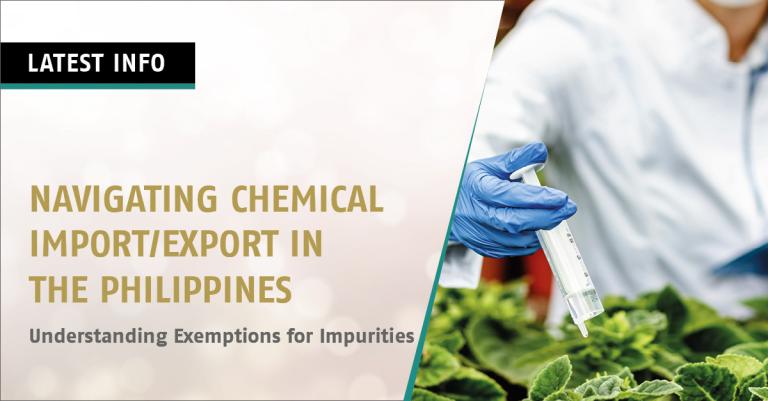Navigating Chemical Import/Export in the Philippines: Understanding Exemptions for Impurities
A recent development in the chemical industry in the country pertains to the handling of "impurities" in chemicals.
Historically, there was a lack of clear definitions and thresholds for impurities, complicating processes such as SQI and/or PMPIN applications for new chemicals.
To address the challenges associated with testing for SQI and/or PMPIN applications for new chemicals, the Department of Environment and Natural Resources - Environmental Management Bureau (DENR-EMB) has introduced a draft policy.
Titled "Guidelines on the Exemption of Impurities, Chemical By-Products, Non-Isolated Intermediates, Alloys, and Statutory Mixtures under Title II of DENR A.O. 1992-29," this policy aims to streamline and clarify the exemption process.
The draft provides comprehensive guidelines for exempting certain chemicals, such as impurities, chemical by-products, non-isolated intermediates, alloys, and statutory mixtures under Title II of DENR A.O. 1992-29.
It introduces clear definitions for these terms and outlines a systematic procedure for exemption applications.
Key requirements include submitting a signed letter of request, detailed composition information, safety data sheets, process flows, a processing fee of Php 1,500, and supporting documents.
One notable aspect of the draft is the shift towards digitization, with the submission and processing of applications taking place online through the Online Permitting and Monitoring System (OPMS).
The review and evaluation period is capped at 15 working days, with applicants required to provide any requested additional information within 30 working days.
Failure to comply within 60 days could result in the cancellation of the exemption application, necessitating a reapplication.
Successfully approved exemptions will liberate chemicals from the requirements of Title II of R.A. 6969, eliminating the need for a permit.
However, certain chemicals specified in Chemical Control Orders will still require permits. The draft also introduces a post-market monitoring procedure inspired by FDA protocols, providing an additional layer of oversight.
Moreover, the draft extends an option for PCL chemicals not covered by the exemption to apply for PCL exemption under specified conditions.
The resulting letter of exemption can be conveniently downloaded and printed through the OPMS account, with a stipulation that it is non-transferable and intended solely for the company addressed in the letter.
For responsible disposal of by-products classified as hazardous waste, the draft emphasizes compliance with DENR Administrative Order (DAO) 2013-22.
Furthermore, recognizing the potential sensitivity of certain information, the draft stresses the need for applicants to indicate if their application contains Confidential Business Information (CBI).
A signed justification letter for CBI applications is required, ensuring a balanced approach to transparency and business confidentiality.
In conclusion, the draft policy by DENR-EMB marks a significant step towards a more transparent and streamlined process for handling impurities in the import/export of chemicals in the Philippines.
Staying abreast of these guidelines is essential for businesses operating in this sector, ensuring compliance with regulations while facilitating smoother operations in the dynamic landscape of chemical trade.


